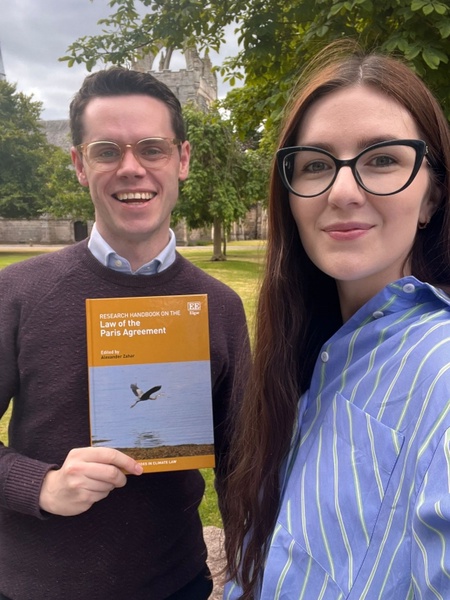Dr Daria Shapovalova (Director, Aberdeen University Centre for Energy Law) and Dr Mitchell Lennan have contributed chapters to an edited collection Research Handbook on the Law of the Paris Agreement edited by Professor Alexander Zahar and published by Edward Elgar. Adopted in 2015 and entering into force in 2016, the Paris Agreement is an international legally binding treaty on climate change and has 195 Parties. It sets out to strengthen the global response to climate change by placing obligations on Parties to take steps to reduce their greenhouse gas emissions to limit global warming to 1.5-2.0 degrees Celsius. This is undertaken through progressive reporting and reviewing of emissions reduction and other climate action by each Party. However, the Agreement has faced criticism regarding its strength as an instrument of international law.
It is timely therefore that the Research Handbook “sets out a systematic analysis of the Paris Agreement taking into account developments since it entered into force in 2016. It explores the treaty’s capacity, as an instrument of international law, to compel state action to address the universal threat of climate change.
Highlighting the strengths and weaknesses of the Paris Agreement in light of state practice, each chapter contains a critical examination of a separate aspect of the treaty in order to aid understanding of its legal force. Eminent scholars with experience in Paris Agreement law explore how the Agreement’s efficacy relies heavily upon the goodwill of states, sui generis domestic initiatives, forceful climate law at the domestic level, and other contextual factors such as international peace and cooperation. Acknowledging the weak legal substance of the Paris Agreement, the expert contributors propose new avenues of scholarly inquiry as well as new directions in the fight against climate change.” (Edward Elgar website).
Dr Shapovalova’s chapter focuses on the constituent norms of the Agreement’s Enhanced Transparency Framework for Action and Support and explores state practice on climate transparency under the growing trend of climate litigation. Dr Lennan’s chapter is co-authored with Professor Elisa Morgera (University of Strathclyde/One Ocean Hub) argues for a mutually supportive interpretation of the Paris Agreement with other environmental agreements and takes a focus on the recent formal inclusion of “ocean-based climate action” into the international climate policy discussion.
The book is available on the Edward Elgar website.
Interested in learning more about climate change and energy transition law and policy? Why not apply for an LLM in Energy Transition Law online or blended or on-campus?


